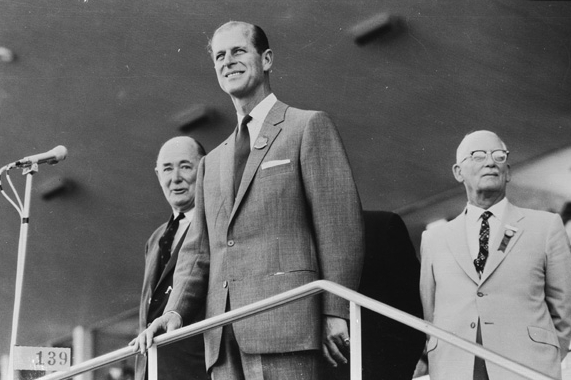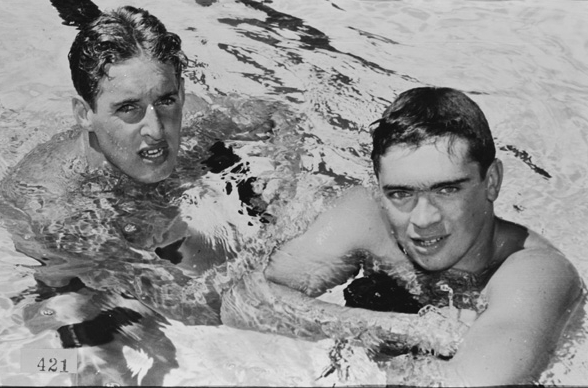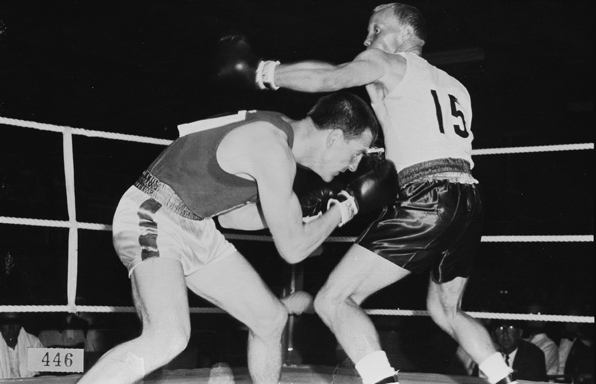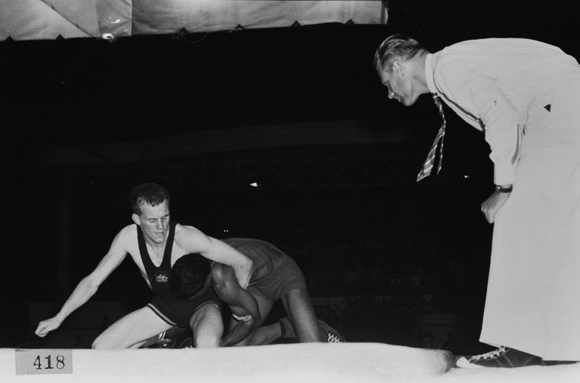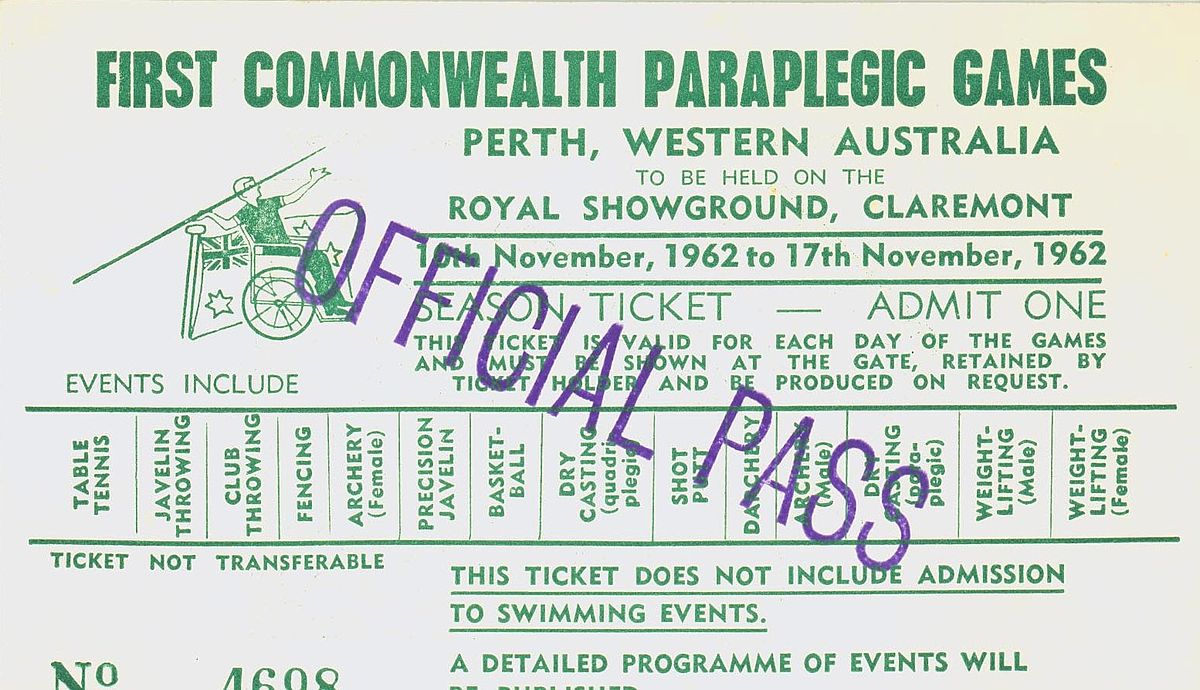1962 Commonwealth and Paraplegic Games
Held in Perth from November 22nd to December 1st, with the first ever Paraplegic Games running November 10-17th, the 1962 British Empire and Commonwealth Games were a showcase of Perth's potential as a hub for international sport, with the Paraplegic games seen as a beacon of rehabilitation in Australia.
Promotional poster for the 1962 Games. (Supplied: ABC)
A combined 210,000 people attended the games in their entirety. At Perry Lakes Stadium, Commonwealth Games spectators enjoyed marches from the Australian Army Guard of Honour and the Western Command Band. While at Claremont Agricultural Grounds, the venue for the world’s first Commonwealth Paraplegic Games, 35 marching bands took to the field during a ceremony which was described as a "colourful spectacle" due to the wide variety of uniforms wore by athletes and officials.
The Commonwealth Games were officially opened by HRH Prince Philip, Duke of Edinburgh at Perry Lakes Stadium, the grounds of which the WA Athletics Stadium now sits, in Floreat. While the Paraplegic games were opened by Premier Charles Gairdner at the Royal Agricultural Showgrounds, in Claremont. 973 Athletes representing 35 of the Commonwealth nations competed at several venues around Perth for a chance to take home gold in a total of 196 events.
Purpose built Perry Lakes Stadium during the 1962 Commonwealth Games opening ceremony. (Supplied: State Library of Western Australia)
HRH Prince Philip, Duke of Edinburgh at the opening ceremony, 22 November 1962. (Supplied: State Library of Western Australia)
Built in 1962, Perry Lakes Stadium served as the venue for both opening and closing ceremonies, as well as track and field events held for the Commonwealth Games. At maximum capacity it could hold an approximate 30,000 spectators and stood proud for almost 50 years until it was demolished in 2009 to make way for the current Western Australian Athletics Stadium. It's estimated a combined 210,000 spectators turned out to view the games in their entirety.
The athletics were held here, with athletes competing in a total of 31 track and field events. The 1962 games saw the reintroduction of two events, the 800 yard and the 3000 metre steeplechase. Heavy winds and hot weather affected the programme, which required soldiers from the Australian Army to hand out cold water to spectators on the day.
Athletes at the beginning of the marathon run. (Supplied: State Library of Western Australia)
Women's 110 yd Breaststroke. (Supplied: State Library of Western Australia)
Kevin Berry (left) after setting a new Games Record in 220 yd butterfly. (Supplied: State Library of Western Australia)
Swimming and diving were held at Beatty Park Leisure Centre, in North Perth. Australia won 15 out of a possible 23 events with Aussie legends Dawn Fraser and Murray Rose taking the gold medal in four events each. The men's and women's diving events were tied for first place with Australian Susan Wright and Briton Brian Phelps winning 2 gold apiece. The women's 110 yard breaststroke (above) was won by English swimmer Anita Lonsbourgh.
English rowing team after successfully defeating Australia in the heat of the men's eights. England would go on to claim bronze, behind New Zealand ( Silver), and Australia (Gold). (Supplied: State Library of Western Australia)
"It's no wonder the city is bursting - both at the seams and with pride. The pride has increased daily as more and more people have arrived by road, rail, sea, and air, and Perth has got properly into its international swing."
-Cynthia Robinson, Australian Women's Weekly, 28 November 1962
One of the most popular sports at the time, the lawn bowls was held at Dalkeith Nedlands Bowling Club and attracted much fanfare. Each event lasted for 12 rounds over a gruelling 4 hour period. English bowler David Bryant (above) emerged the undeniable victor of the men's singles, winning all twelve rounds to take home gold, while Rhodesia & Nyasaland (now part of modern day Zimbabwe) achieved an upset win over England in the bronze medal play-off in the men's pairs. (Supplied: State Library of Western Australia)
Lake Monger Velodrome (now E & D Litis Stadium), in Leederville, was purpose built for the cycling events at the Commonwealth Games. The four track cycling races were held here, while the road cycle took place in and among King's Park. The velodrome has since been converted into a soccer field. (Supplied: State Library of Western Australia)
Hosted at Perry Lakes Basketball Stadium, boxing was the most widely contested event of the Games, with seven separate nations fielding gold medal winners out of the ten weight classes. Overall Ghana was the most successful nation, with six total medals going to Ghanaian athletes. (Supplied: State Library of Western Australia)
Pakistan dominated the wrestling events, held at the Royal King's Park Tennis Club, winning 7 gold out of 8 weight divisions. (Supplied: State Library of Western Australia)
The Paraplegic Games were conceived by Australian doctor Sir George Montario Bedbrook OBE, and were sponsored and organised by Royal Perth Hospital. They were the first time Perth would play host to major sporting event and paved the way for Western Australia's great history with international sport. Athletes and spectators alike praised the organisation of the event, as well as the provided facilities, such as a television lounge, shop, and women's hairdresser. Additional events exclusive to the Paraplegic games included archery, dartchery, snooker, and table tennis.
"Then was the moment to think of the fabulous organisation that went into the Games, from start to finish there wasn't a hitch. If we needed a postage stamp, that was easy. If licking the back of it had given us a thirst for iced water, that was easy too. The highest tribute that can be paid is that it all appeared so effortless, as though it all just happened".
-Sir Gaynor Harry KBE, Welsh athlete, "Wales to Western Australia for the 'Para' Games", 1963
Gathered athletes before the commencement of the first Commonwealth Paraplegic Games (Supplied: Wikimedia Commons)
Admit one official pass to the Paraplegic Games (Supplied: Wikimedia Commons)
The closing ceremony on 1 December 1962 marked the end of an incredible month of sport and friendly competition that brought Perth right to the centre of the world stage. Overall Australia placed first on the medal tally with a total of 195 medals (76 gold), followed by England in second. New Zealand came third in the Commonwealth Games and Rhodesia & Nyasaland (modern day Zimbabwe) placed third in the Paraplegic Games. (Supplied: State Library of Western Australia)



